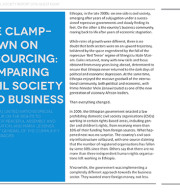
Issue No. 14 of the Assembly and Association Briefing, the newsletter of Maina Kiai, UN Special Rapporteur on the rights to freedom of peaceful assembly and of association. In this issue: • Pull the plug on televised reprisals against rights defenders in Venezuela • ‘Cambodia’s NGO Bill threatens a free and independent civil society’ – UN expert urges Senate to reject it • Burundi: UN experts call for determined Security Council action to prevent mass violence • Bahrain: Freed from jail, all charges against Nabeel Rajab must be dropped • The clamp-down on resourcing: comparing how States regulate business and civil society • ‘Lawyers need to be protected not harassed,’ UN experts urge China to halt detentions • Freedom of association and assembly: By the numbers • Special Rapporteur news in brief: July-August 2015 • World briefing: Freedom of assembly and association in the news For a link to the newsletter, click on the image at right or click here (1.6MB file) or here (2.9MB full resolution file). To subscribe to our newsletter, please drop us a line at info@freeassembly.net with the subject line “subscribe to newsletter.” For other recent newsletters, see the links below: The Assembly and Association Briefing, Vol. 2, No. 2 (Issue 11)... Continue reading →

UN Special Rapporteur Maina Kiai has co-authored an essay with Community of Democracies Secretary General Maria Leissner comparing the ability of business and civil society to access resources worldwide. The piece appears in CIVICUS's 2015 "State of Civil Society Report," and previews one of the issues that the Special Rapporteur will explore in his upcoming report to the UN General Assembly in October 2015. "At first glance, the business and civil society sectors may seem strange bedfellows for comparison. Conventional wisdom tells us that these two entities are distinct, warranting separate rules and treatment," Kiai and Leissner write. "But beyond their dissimilar profit motives, just how different are businesses and civil society? And how differently should governments treat them?" The essay cites a number of examples where several governments go to much greater lengths to create a conducive environment for business investment, while virtually shutting off similar funding for civil society. Ethiopia, for example, has actively encouraged foreign investment in its business sector over the past seven years, leading to an economic boom. The country is now creating millionaires faster than any country on earth, while gross domestic product growth has averaged 39% a year, according to one source.... Continue reading →